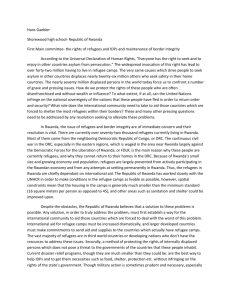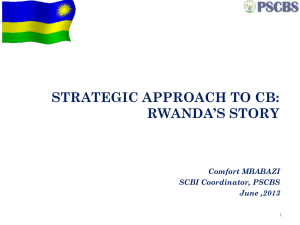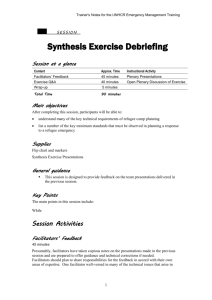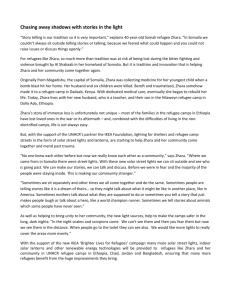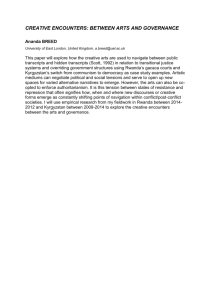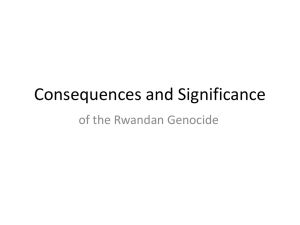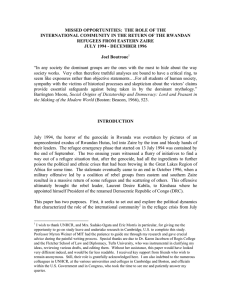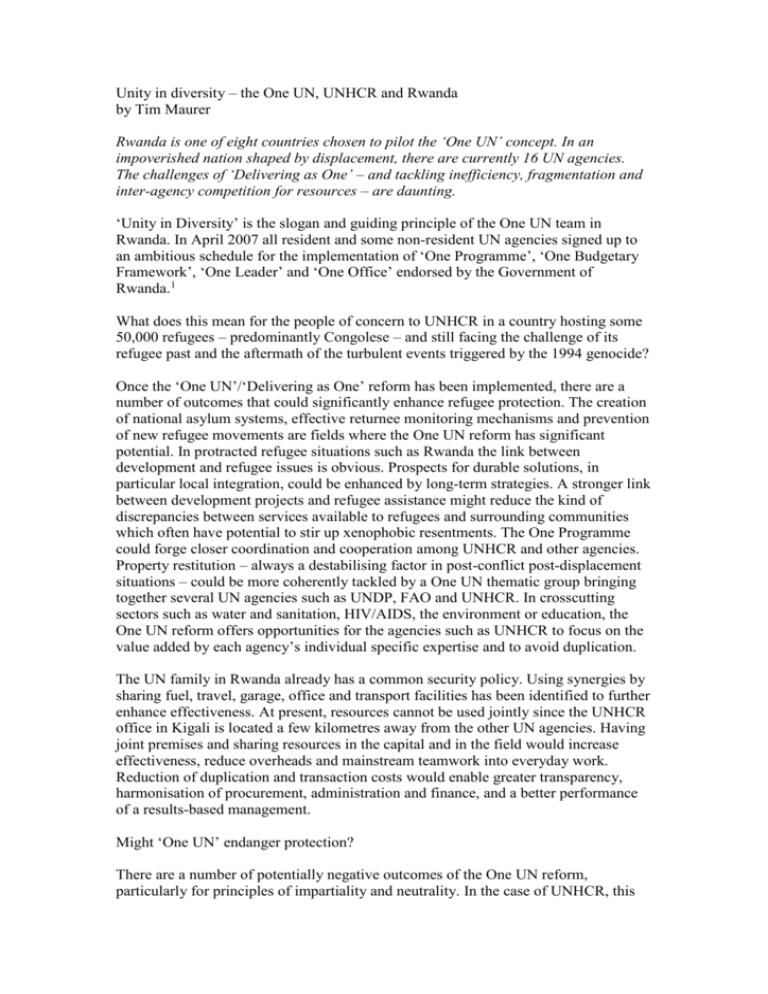
Unity in diversity – the One UN, UNHCR and Rwanda
by Tim Maurer
Rwanda is one of eight countries chosen to pilot the ‘One UN’ concept. In an
impoverished nation shaped by displacement, there are currently 16 UN agencies.
The challenges of ‘Delivering as One’ – and tackling inefficiency, fragmentation and
inter-agency competition for resources – are daunting.
‘Unity in Diversity’ is the slogan and guiding principle of the One UN team in
Rwanda. In April 2007 all resident and some non-resident UN agencies signed up to
an ambitious schedule for the implementation of ‘One Programme’, ‘One Budgetary
Framework’, ‘One Leader’ and ‘One Office’ endorsed by the Government of
Rwanda.1
What does this mean for the people of concern to UNHCR in a country hosting some
50,000 refugees – predominantly Congolese – and still facing the challenge of its
refugee past and the aftermath of the turbulent events triggered by the 1994 genocide?
Once the ‘One UN’/‘Delivering as One’ reform has been implemented, there are a
number of outcomes that could significantly enhance refugee protection. The creation
of national asylum systems, effective returnee monitoring mechanisms and prevention
of new refugee movements are fields where the One UN reform has significant
potential. In protracted refugee situations such as Rwanda the link between
development and refugee issues is obvious. Prospects for durable solutions, in
particular local integration, could be enhanced by long-term strategies. A stronger link
between development projects and refugee assistance might reduce the kind of
discrepancies between services available to refugees and surrounding communities
which often have potential to stir up xenophobic resentments. The One Programme
could forge closer coordination and cooperation among UNHCR and other agencies.
Property restitution – always a destabilising factor in post-conflict post-displacement
situations – could be more coherently tackled by a One UN thematic group bringing
together several UN agencies such as UNDP, FAO and UNHCR. In crosscutting
sectors such as water and sanitation, HIV/AIDS, the environment or education, the
One UN reform offers opportunities for the agencies such as UNHCR to focus on the
value added by each agency’s individual specific expertise and to avoid duplication.
The UN family in Rwanda already has a common security policy. Using synergies by
sharing fuel, travel, garage, office and transport facilities has been identified to further
enhance effectiveness. At present, resources cannot be used jointly since the UNHCR
office in Kigali is located a few kilometres away from the other UN agencies. Having
joint premises and sharing resources in the capital and in the field would increase
effectiveness, reduce overheads and mainstream teamwork into everyday work.
Reduction of duplication and transaction costs would enable greater transparency,
harmonisation of procurement, administration and finance, and a better performance
of a results-based management.
Might ‘One UN’ endanger protection?
There are a number of potentially negative outcomes of the One UN reform,
particularly for principles of impartiality and neutrality. In the case of UNHCR, this
concerns its special mandate based on the 1951 Convention and 1967 Protocol and its
independence of action to guarantee the protection of people at risk of refoulement. In
the greater picture these concerns centre on a rights-based approach. Moustapha
Soumaré, the UN Resident Coordinator in Kigali, stated during the signing ceremony
of the One UN Concept Paper that the reform is based on principles of “ownership,
comparative advantage and maximum effectiveness and accountability.” To what
degree will a One UN be able to take into account the rights reserved for specific
groups such as refugees and asylum seekers? It is not clear how safeguards such as the
principle of non-refoulement can continue to be guaranteed given that the process is
government-owned, -signed and -driven.
In order that government ownership does not compromise the impartiality and
neutrality of the UN, the systematic integration of the principles outlined in the UN
Charter, international conventions and international law will be crucial. The One UN
Concept Paper in Rwanda outlines its vision that “The UN Charter and Universal
Declaration of Human Rights, together with the seven core conventions, provide
overall guidance to the UN system in Rwanda.” Much will depend on how the One
Leader role is implemented and what role human rights will play once the Resident
Coordinator takes the lead in representing the UN system. Ultimately, the neutrality of
the UN is preserved by reminding governments of their primary responsibilities and
obligations derived from international treaties as well as international customary law.
When the UN speaks with one voice through One Leader, advocacy could be more
effective than when a single UN agency raises issues of concern with governments. In
the case of the Security Council’s denunciation of repeated recruitment of refugee
children from Rwandan camps, for example, a strengthened ‘One UN’ system might
be more effective in producing results on the ground.
Given the chequered history of the UN in Rwanda, successful roll-out of the One UN
reform would project a strong signal and a step forward not only for Rwanda but the
entire troubled Great Lakes region. The reform has the support of the donor
community which is now united in calling – via the Paris Declaration process2 – for
more accountability, transparency and effectiveness in the aid system. Expectations
are high. Success will depend on the in-house capacity and willingness to view this
process as an opportunity for the UN system as a whole rather than to the advantage
of a single agency only. Particular caution ought to be exercised in regard to the
integration of human rights. It is up to the UN to prove if it is capable of Delivering as
One or if the danger of becoming marginalised will prevail. The success or the failure
of the One UN reform is first and foremost in the hands of the UN itself.
Tim Maurer (tim.maurer@fu-berlin.de) worked as an intern with UNHCR in Kigali in
2006 and in Geneva in 2007. He is a student of political science at the Otto-SuhrInstitut für Politikwissenschaft of the Freie Universität Berlin.
The views expressed in this article are those of the author and do not necessarily
represent the views of the UN.
‘One UN: ‘Delivering as One’ in Rwanda; Concept Paper’, Office of the Resident Coordinator, April
2007. www.undg.org/docs/7100/070405%20One%20UN%20Concept%20Paper%20%20Signing%20version.pdf
2
www.oecd.org/document/18/0,2340,en_2649_3236398_35401554_1_1_1_1,00.html
1


